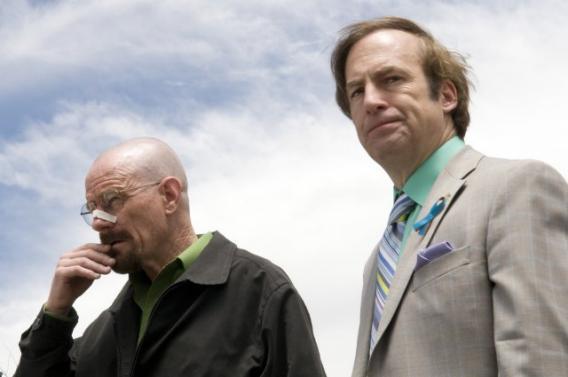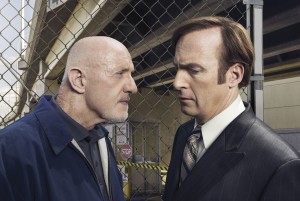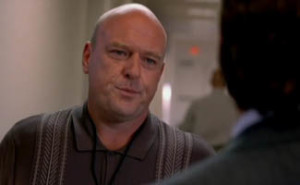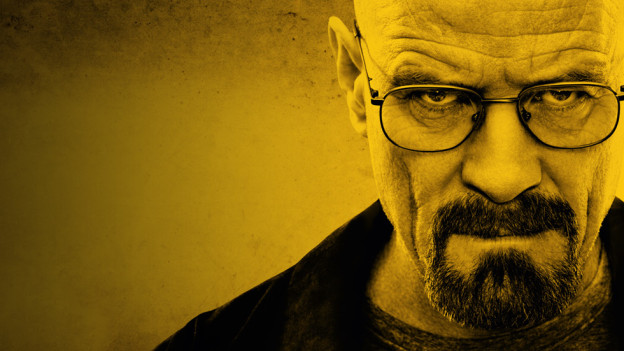
One of the beauties of Breaking Bad TV series was that no truth occurred without consequences: dead bodies needed disposing; stolen money had to be laundered; sins did not go unpunished.
And so it goes with El Camino: A Breaking Bad Movie, the searing new film from Netflix and series creator Vince Gilligan. Taught, tense and forever-time-hopping, Camino is a fitting bookend to one of the finest shows ever on television.
Written and directed by Gilligan, Camino deftly maintains the momentum of the series, even though it ended six years ago, thanks to star Aaron Paul, who always gave the show its sense of levity and, despite being a meth-sling dope dealer, likability as Jesse Pinkman. Despite some missteps on the big screen recently like Need for Speed, Paul demonstrates his range again in Camino. The movie looks terrific, sounds great and if you’re a fan, is filled with references and cameos that are sure to amuse show diehards.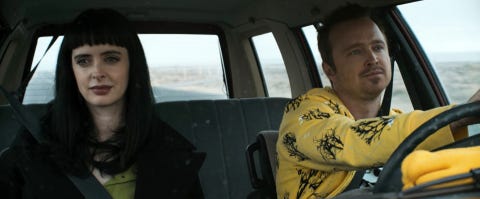
Like many Breaking Bad episodes, Camino picks up immediately where the last scene left off. In this case, its aftermath of the 2013 Breaking Bad finale, with Jesse driving away from the bloodbath that left a lot of neo-Nazis, and also Bryan Cranston’s Walter White, dead. While some series viewers may have assumed Jesse drove off into the sunset, true Breaking Bad fans know the series settles for no such tropes. Jesse remains a fugitive in Camino, on the run from both cops and criminals, who are sometimes hard to tell apart.
Bad was always a stylish thriller, and in Camino, Gilligan directs just as energetically with a bigger-looking budget and flashier pyrotechnics. In many ways, Camino serves both a reunion show and an alternative series finale (although the original one was terrific).
But make no mistake: with Walt left for dead in the Bad finale, Camino is Jesse’s story through and through. Flashbacks allow dead favorites like mentor Mike (Jonathan Banks), girlfriend Jane (Krysten Ritter), and Walt himself prod Jesse toward a lifestyle change: “Only you can decide what’s best for you,” one character advises him.
But what’s best, Jesse and Camino decide, is a little retribution sprinkled with a lot of freedom. It’s a simple theme, and fodder for countless films and TV series. But in Gilligan’s hands, you’ll find little that resembles a stereotypical film or series.
Part of what makes Camino hum is not the continuation of a compelling story, but the unexpected prequel-izing it does with characters we thought we knew, particularly Skinny Pete (Charles Baker) and Todd (Jesse Plemons). We knew Pete was surprisingly sophisticated (he once memorably tickled the ivories in a BB episode), but Camino establishes him as a near-paternal friend. Baker is mesmerizing; at a little over two hours, it’s a shame Camino couldn’t fit him into more scenes.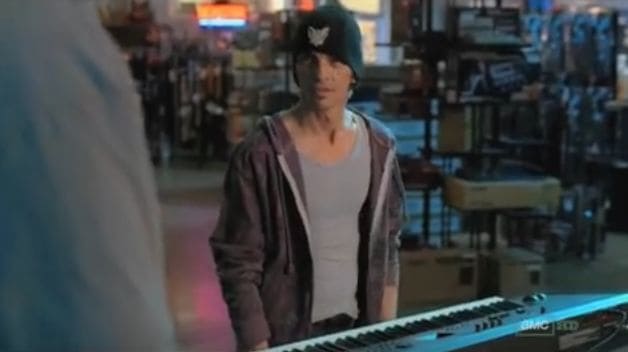
The true jaw-dropper, though, is Plemons (Fargo TV series). Todd was always an only-half-detestable killer who was hardly one of the series’ multiple evil geniuses. Here, though, his sociopathic tendencies are on full display. In one scene, he sings the virtues of a bystander he killed without a second thought. In another, Plemons provides the funniest scene in the movie as he drives down the highway after an atrocity, crooning to Dr. Hook’s Sharing the Night Together, signaling like a kid for a passing big rig to sound its horn.
Camino‘s final showdown lets Gilligan indulge his love of movie Westerns, which always informed the series. It may feel reminiscent of the show’s final episode, Felina, with its meticulous planning and execution. But, like Felina, it’s an example of the pinpoint technical proficiency and directing that runs through Camino.
If any elements of the movie disappoints fans, it may be the lack of surprises and plot twists. But this is, after all, supposed to be Breaking Bad’s final exit. Gilligan couldn’t afford any more questions that needed answers.
Instead, Camino‘s larger purpose may be for us to moderate our perspective about the show. Gilligan always described the series as Mr. Chips becomes Scarface, which was always Walter’s story. But perhaps Gilligan realized just how much narrative truly belonged to Jesse. And if you believed Jesse got short shrift in the finale, Camino goes a long way to making that narrative equitable. Either way, fans will remember just how good it can feel to break bad.


